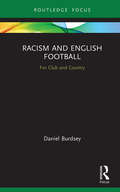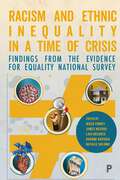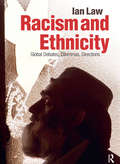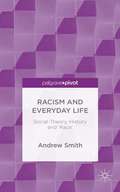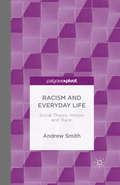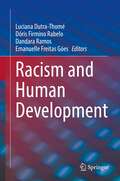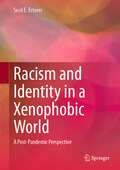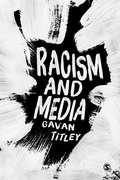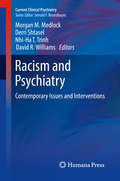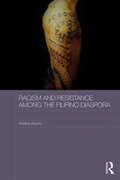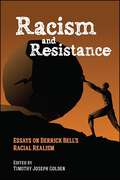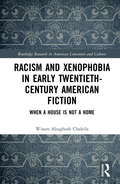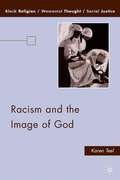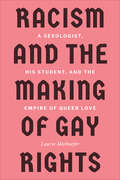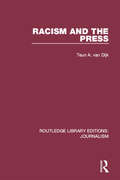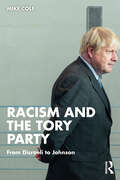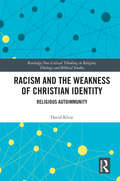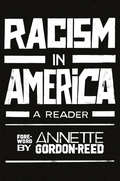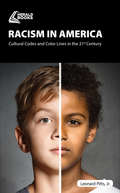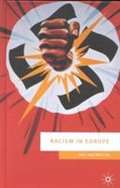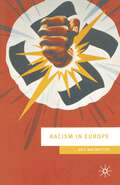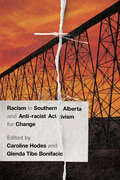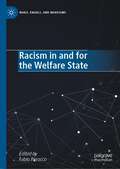- Table View
- List View
Racism and English Football: For Club and Country (Routledge Focus on Sport, Culture and Society)
by Daniel BurdseyRacism and English Football: For Club and Country analyses the contemporary manifestations, outcomes and implications of the fractious relationship between English professional football and race. Racism, we were told, had disappeared from English football. It was relegated to a distant past, and displaced onto other European countries. When its appearance could not be denied, it was said to have reappeared. This book reveals that this was not true. Racism did not go away and did not return. It was here all along. The book argues that racism is firmly embedded and historically rooted in the game’s structures, cultures and institutions, and operates as a form of systemic discrimination. It addresses the ways that racism has tainted English football, and the manner in which football has, in turn, influenced racial meanings and formations in wider society. Equally, it explores how football has facilitated forms of occupational multiculture, black player activism and progressive fan politics that resist divisive social phenomena and offer a degree of hope for an alternative future. Focusing on a diverse range of topics, in men’s and women’s football, at club and international level, Racism and English Football extends and expands our knowledge of how racism occurs and, critically, how it can be challenged. This is an essential read for scholars and students working on race, ethnicity, sport and popular culture, together with those interested in the social and organisational dynamics of English professional football more generally.
Racism and Ethnic Inequality in a Time of Crisis: Findings from the Evidence for Equality National Survey
by Nissa Finney, James Nazroo, Laia Bécares, Dharmi Kapadia and Natalie ShlomoePUB and EPDF available Open Access under CC-BY-NC-ND licence. This book examines how and why experiences of the COVID-19 pandemic in Britain varied according to ethnicity. Drawing from the Evidence for Equality National Survey (EVENS), the book compares the experiences of ethnic and religious minority groups and White British people in work and finances, housing and communities, health and wellbeing, policing and politics, and racism and discrimination in Britain. Using unrivalled data in terms of population and topic coverage and complete with bespoke graphics, contributors present new evidence of ethnic inequalities and racism, opening them up to debate as crucial social concerns. Written by leading international experts in the field, this is a must-read for anyone interested in contemporary ethnic inequalities and racism, from academics and policymakers to voluntary and community sector organisations.
Racism and Ethnicity: Global Debates, Dilemmas, Directions
by Ian LawRacism and Ethnicity: Global Debates, Dilemmas, Directions examines in detail the theories, histories and principal debates of race, racism and ethnicity within a global context. The text offers critical evaluation of the work of major figures from Du Bois to Goldberg, and presents new research on pre-modern racisms, contemporary scientific racisms, racist violence, racism reduction, ethnicity in the UK and European patterns of exclusion and discrimination. Richly illustrated throughout with examples and case studies drawn from across the world and time, the book also offers a range of in-text features to aid study, including: chapter summaries, key concept boxes, chapter activities and further reading.Racism and Ethnicity: Global Debates, Dilemmas, Directions will be core reading for students at all levels across the social sciences and the humanities ranging from history and cultural studies through sociology to political and policy analysis. It will also be of significant interest to researchers and policy makers in a range of fields.
Racism and Everyday Life: Social Theory, History and 'Race'
by Andrew SmithRacism and Everyday Life.
Racism and Everyday Life: Social Theory, History and 'Race'
by Andrew SmithWhat does it mean to talk about everyday racism, and why should we do so? Racism and Everyday Life brings together the sociologies of racism and everyday life in a new way in order to reflect on these questions. Smith argues that racism and everyday life are not just 'act' and 'context' respectively, but rather they are part of the making of each other. Using a variety of historical and contemporary examples, this book draws on the pioneering insights of W.E.B. Du Bois and other writers in order to explore the interwoven relationship between racism and the everyday.
Racism and Human Development
by Luciana Dutra-Thomé Dóris Firmino Rabelo Dandara Ramos Emanuelle Freitas GóesThis book addresses the lifelong effects of racism, covering its social, psychological, family, community and health impacts. The studies brought together in this contributed volume discuss experiences of discrimination, prejudice and exclusion experienced by children, young people, adults, older adults and their families; the processes of socialization, emotional regulation and construction of ethnic-racial identities; and stress-producing events associated with racism. This volume intends to contribute to a growing international effort to develop an antiracist agenda in developmental psychology by showcasing studies developed mainly in Brazil, the country with the largest black population in the world outside of Africa. Racism as an ideology that structures social relations and attributes superiority to one race over the others have developed in different ways in different countries. As a response to the 2020 social and health crisis, some North American developmental psychologists have started promoting initiatives to openly challenge racism. This book intends to contribute to this movement by bringing together studies conducted mainly in Brazil, but also in Germany and Norway, that adopt a racially informed approach to different topics in developmental psychology. Racism and Human Development intends to be an inspiration to students, scholars and practitioners who are seeking tools and examples of studies of race and racism from a developmental perspective. The establishment of an antiracist agenda in developmental psychology will never be possible without a commitment to the study of race as an indispensable social marker of human ontogeny in any society. This book is another step towards racial equity and towards a developmental science that leaves no one behind.
Racism and Identity in a Xenophobic World: A Post-Pandemic Perspective
by Secil E. ErtorerThis book is written against the backdrop of heightened racism and xenophobia in the contemporary world. It elucidates how ‘race’ operates in racially and ethnically diverse societies and becomes a divisive force. The book offers an interdisciplinary, multi-level model for understanding the roots of racial prejudice and hatred towards the 'other' by incorporating individual, group, institutional, and societal factors. Moreover, it elaborates on the negative effects of racism on the identity and psychological well-being of individuals and proposes strategies to counteract these issues. An empirical study conducted with Asian American and Pacific Islander communities during the COVID-19 pandemic demonstrates the practical application of the theory. The significant increase in anti-Asian racism from 2020 to 2022 illustrates how easily xenophobia and racism can be triggered during times of rapid change, instability, and uncertainty. While the primary focus is on the USA, the study's findings are relevant to multiracial societies globally. This book is intended for researchers and students of interdisciplinary social sciences interested in inequality, racism, and othering, as well as those studying the Asian diaspora. It is also of wider interest to anyone, especially practitioners, seeking to understand and dismantle the problem of heightened 'othering' and racism.
Racism and Media
by Gavan TitleyDigital media have radically altered understandings of racism, so that an issue that has too often been assumed to belong to the past has been thrust into contemporary mainstream debates, news and popular culture. In light of the importance of traditional communications and social media to such events as Brexit in the UK and the Trump Presidency in the US, it is imperative for students of media and public discourse to examine the role played by the media in the generation, circulation and contestation of racist ideas. In Racism and Media, Gavan Titley: Explains why racism is such a complex and contested concept Provides a set of theoretical and analytical tools with which to interrogate how media dynamics and processes impact on racism and anti-racism Demonstrates methods’ application through a wide range of case studies, taking in examples from the UK, US, and several European countries Examines the rise and impact of online and social media racism Analyses questions of freedom of speech and hate speech in relation to racism and media This book is an essential companion for students of media, communications, sociology and cultural studies.
Racism and Media
by Gavan TitleyDigital media have radically altered understandings of racism, so that an issue that has too often been assumed to belong to the past has been thrust into contemporary mainstream debates, news and popular culture. In light of the importance of traditional communications and social media to such events as Brexit in the UK and the Trump Presidency in the US, it is imperative for students of media and public discourse to examine the role played by the media in the generation, circulation and contestation of racist ideas. In Racism and Media, Gavan Titley: Explains why racism is such a complex and contested concept Provides a set of theoretical and analytical tools with which to interrogate how media dynamics and processes impact on racism and anti-racism Demonstrates methods’ application through a wide range of case studies, taking in examples from the UK, US, and several European countries Examines the rise and impact of online and social media racism Analyses questions of freedom of speech and hate speech in relation to racism and media This book is an essential companion for students of media, communications, sociology and cultural studies.
Racism and Psychiatry: Formulation And Treatment In A Social Justice Era (Current Clinical Psychiatry)
by David R. Williams Morgan M. Medlock Derri Shtasel Nhi-Ha T. TrinhThis book addresses the unique sociocultural and historical systems of oppression that have alienated African-American and other racial minority patients within the mental healthcare system. This text aims to build a novel didactic curriculum addressing racism, justice, and community mental health as these issues intersect clinical practice. Unlike any other resource, this guide moves beyond an exploration of the problem of racism and its detrimental effects, to a practical, solution-oriented discussion of how to understand and approach the mental health consequences with a lens and sensitivity for contemporary justice issues. After establishing the historical context of racism within organized medicine and psychiatry, the text boldly examines contemporary issues, including clinical biases in diagnosis and treatment, addiction and incarceration, and perspectives on providing psychotherapy to racial minorities. The text concludes with chapters covering training and medical education within this sphere, approaches to supporting patients coping with racism and discrimination, and strategies for changing institutional practices in mental healthcare. Written by thought leaders in the field, Racism and Psychiatry is the only current tool for psychiatrists, psychologists, administrators, educators, medical students, social workers, and all clinicians working to treat patients dealing with issues of racism at the point of mental healthcare.
Racism and Resistance among the Filipino Diaspora: Everyday Anti-racism in Australia (Routledge Series on Asian Migration)
by Kristine AquinoFilipino migrants constitute one of the largest global diasporas today. In Australia, Filipino settlement is markedly framed by the country’s on-going nation-building project that continues to racialise immigrants and delineate the possibilities and limits of belonging to the national community. This book explores the ways in which Filipino migrants in Australia experience, understand and negotiate racism in their everyday lives. In particular, it explores the notion of everyday anti-racism – the strategies individuals deploy to manage racism in their day to day lives. Through case studies based on extensive fieldwork the author shares ethnographic observation and interview material that demonstrate the ways in which Filipinos are racially constituted in Australian society and are subject to everyday racisms that criss-cross different modes of power and domination. Drawing on theoretical approaches in critical race scholarship and the sociology of everyday life, this book illuminates the operation of racism in a multicultural society that persists insidiously in exchanges across a range of public and private spaces. More importantly, it explores the quotidian ways in which ‘victims’ of racism cope with routine racialised domination, an area underdeveloped in anti-racism research that has tended to focus on institutional anti-racism politics. Shedding light on a neglected corner of the global Filipino diaspora and highlighting the complexity of lived experiences in translocal and transnational social fields, this book will be of interest to academics in the field of diaspora and migration studies, the study of race and racism and ethnic minorities, with particular reference to the Asian diaspora.
Racism and Resistance: Essays on Derrick Bell's Racial Realism (SUNY series in African American Studies)
by Timothy Joseph GoldenAfrican American legal theorist Derrick Bell argued that American anti-Black racism is permanent but that we are nevertheless morally obligated to resist it. Bell—an extraordinary legal scholar, activist, and public intellectual whose academic and political work included his employment as a young attorney with the NAACP and his pivotal role in the founding of Critical Race Theory in the 1970s, work he pursued until he died in 2011—termed this thesis “racial realism.” Racism and Resistance is a collection of essays that present a multidisciplinary study of Bell's thesis. Scholars in philosophy, law, theology, and rhetoric employ various methods to present original interpretations of Bell's racial realism, including critical reflections on racial realism’s relationship to theories of adjudication in jurisprudence; its use of fiction in relation to law, literature, and politics; its under-examined relationship to theology; its application in interpersonal relationships; and its place in the overall evolution of Bell’s thought. Racism and Resistance thus presents novel interpretations of Bell’s racial realism and enhances the literature on Critical Race Theory accordingly.
Racism and Xenophobia in Early Twentieth-Century American Fiction: When a House is Not a Home (Routledge Research in American Literature and Culture)
by Wisam Abughosh Chaleila"The Melting Pot," "The Land of The Free," "The Land of Opportunity." These tropes or nicknames apparently reflect the freedom and open-armed welcome that the United States of America offers. However, the chronicles of history do not complement that image. These historical happenings have not often been brought into the focus of Modernist literary criticism, though their existence in the record is clear. This book aims to discuss these chronicles, displaying in great detail the underpinnings and subtle references of racism and xenophobia embedded so deeply in both fictional and real personas, whether they are characters, writers, legislators, or the common people. In the main chapters, literary works are dissected so as to underline the intolerance hidden behind words of righteousness and blind trust, as if such is the norm. Though history is taught, it is not so thoroughly examined. To our misfortune, we naively think that bigoted ideas are not a thing we could become afflicted with. They are antiques from the past – yet they possessed many hundreds of people and they surround us still. Since we’ve experienced very little change, it seems discipline is necessary to truly attempt to be rid of these ideas.
Racism and the Image of God
by Karen TeelFrom her perspective as a white feminist theologian, Karen Teel dialogues with five womanist thinkers to develop a Christian theology of the body that can compel Christians, especially U. S. Christians of European descent, to actively resist the sin of racism.
Racism and the Making of Gay Rights: A Sexologist, His Student, and the Empire of Queer Love
by Laurie MarhoeferIn 1931, a sexologist arrived in colonial Shanghai to give a public lecture about homosexuality. In the audience was a medical student. The sexologist, Magnus Hirschfeld, fell in love with the medical student, Li Shiu Tong. Li became Hirschfeld’s assistant on a lecture tour around the world. Racism and the Making of Gay Rights shows how Hirschfeld laid the groundwork for modern gay rights, and how he did so by borrowing from a disturbing set of racist, imperial, and eugenic ideas. Following Hirschfeld and Li in their travels through the American, Dutch, and British empires, from Manila to Tel Aviv to having tea with Langston Hughes in New York City, and then into exile in Hitler’s Europe, Laurie Marhoefer provides a vivid portrait of queer lives in the 1930s and of the turbulent, often-forgotten first chapter of gay rights.
Racism and the Press (Routledge Library Editions: Journalism #5)
by Teun A. van DijkOriginally published in 1991. This book presents the results of an interdisciplinary study of the press coverage of ethnic affairs. Examples are drawn mainly from British and Dutch newspapers, but data from other countries are also reviewed. Besides providing the reader with a thorough content analysis of the material, the book is the first to introduce a detailed discourse analytical approach to the study of the ways in which ethnic minorities are portrayed in the press. The approach focuses on the topics, overall news report schemata, local meanings, style and rhetoric of news reports. Highly original, accomplished and penetrating, the book is the fruit of a decade of research into the question of racism and the press, important for ethnic studies, mass communication and media studies, sociology and linguistics.
Racism and the Tory Party: From Disraeli to Johnson
by Mike ColeRacism is an endemic feature of the Tory Party. Tracing the history of that racism, Racism and the Tory Party investigates the changing forms of racism in the party from the days of Empire, including the championing of imperialism at the turn of the 20th century and the ramping up of antisemitism, the imperial and ‘racial’ politics of Winston Churchill, the rise of Enoch Powell and Powellism, to the Margaret Thatcher years, the birth of ‘racecraft’ and her polices in Northern Ireland, and the hostile environment and its consolidation and expansion under Theresa May and Boris Johnson’s premierships. Throughout the book, all forms of racism are addressed including the various forms of colour-coded and as well as non-colour-coded racism as they are put in their historical and economic contexts. This book should be of relevance to all interested in British politics and British history, as well as undergraduate and postgraduate students studying the sociology and politics of racism, as well as for students of the history of the development of British racism and of imperialism and its aftermath.
Racism and the Weakness of Christian Identity: Religious Autoimmunity (Routledge New Critical Thinking in Religion, Theology and Biblical Studies)
by David KlineDespite the command from Christ to love your neighbour, Western Christianity has continued to be afflicted by the evil of racism and the acts of violence that accompany it. Through a systems theoretical and deconstructive account of religion and the political theology of St. Paul, this book traces how the racism and violence of modern Western Christianity is a symptom of its failure to secure its own myth of sovereignty within a complex world of plurality. Divided into three sections, the book begins with a philosophical and critical account of what it calls the immune system of Christian identity. Focusing on Pauline political theology as reflective of an inherent religious "autoimmunity" built into Christian community, a theory of theological-political violence is located within Western Christianity. The second section traces major theoretical aspects of the historical "apparatus" of Christian Identity. It demonstrates that it is ultimately around the figure of the black slave that racialized Christian identity becomes a system of anti-blackness and white supremacy. The book concludes by offering strategies for thinking resistance against such racialised Christian identity. It does this by constructing a "pragmatics of faith" by engaging Deleuze’s and Guattari’s use of the term pragmatics, Moten’s theory of black fugitivity, and Long’s account of African American religious production. This wide-ranging and interdisciplinary view of Christianity’s relationship to racism will be of keen interest to scholars of Religious Studies, Theological Studies, Cultural Studies, Critical Race Studies, American Studies, and Critical Theory.
Racism in America: A Reader
by Annette Gordon-ReedRacism in America has been the subject of serious scholarship for decades. At Harvard University Press, we’ve had the honor of publishing some of the most influential books on the subject. The excerpts in this volume—culled from works of history, law, sociology, medicine, economics, critical theory, philosophy, art, and literature—are an invitation to understand anti-Black racism through the eyes of our most incisive commentators. Readers will find such classic selections as Toni Morrison’s description of the Africanist presence in the White American literary imagination, Walter Johnson’s depiction of the nation’s largest slave market, and Stuart Hall’s theorization of the relationship between race and nationhood. More recent voices include Khalil Gibran Muhammad on the pernicious myth of Black criminality, Elizabeth Hinton on the link between mass incarceration and 1960s social welfare programs, Anthony Abraham Jack on how elite institutions continue to fail first-generation college students, Mehrsa Baradaran on the racial wealth gap, Nicole Fleetwood on carceral art, and Joshua Bennett on the anti-Black bias implicit in how we talk about animals and the environment. Because the experiences of non-White people are integral to the history of racism and often bound up in the story of Black Americans, we have included writers who focus on the struggles of Native Americans, Latinos, and Asians as well. Racism in America is for all curious readers, teachers, and students who wish to discover for themselves the complex and rewarding intellectual work that has sustained our national conversation on race and will continue to guide us in future years.
Racism in America: Cultural Codes and Color Lines in the 21st Century
by Leonard Pitts Jr.The Pulitzer Prize-winning columnist examines the state of racism in 21st century America in this pithy and provocative essay collection. As Leonard Pitts states in his introduction, &“Race is the stupidest idea in history.&” It is also, tragically, one of the most deeply engrained ideas in American society. In this collection of his finest articles from the Miami Herald, Pitts explores the pervasive influence of this insidious idea, tracing its evolution through American history and confronting its myriad faces today. Along with probing explorations of blackness and identity, Pitts takes on such hot-button issues as the Confederate Flag, notorious N-word, and the spurious notion of reverse discrimination. Pitts also grapples with the devastating realities Black Americans face, from the senseless death of Trayvon Martin to the rise of Trumpism and the need to insist—now more than ever—that Black Lives Matter.
Racism in Europe 1870–2000
by Neil MacmasterThe study of modern racism has tended to treat anti-Semitism and anti-black racism as separate and unconnected phenomena. This innovative study argues that a full understanding of the origins and development of racism in Europe after 1870 needs to examine the structure and interrelationships between the two dominant forms of prejudice. Contrary to expectation. anti-black racism was not confined to the colonial maritime nations of western Europe, but pepetrated even the rural societies of central and eastern Europe. Likewise, anti-Semitism could flourish even in the almost total absence of Jews. MacMaster explores the conditions under which modern political movements, faced with the crisis of modernity, began to draw upon and mobilise the negative stereotypes that, through the development of the mass media, had become almost universal features of popular culture. By weaving together the changing spatial and temporal dimensions of anti-Semitic and anti-black prejudice the study provides a fresh and more global framework for understanding modern racism.
Racism in Europe: 1870-2000 (European Culture and Society)
by Neil MacMasterThe study of modern racism has tended to treat anti-Semitism and anti-black racism as separate and unconnected phenomena. This innovative study argues that a full understanding of the origins and development of racism in Europe after 1870 needs to examine the structure and interrelationships between the two dominant forms of prejudice. Contrary to expectation. anti-black racism was not confined to the colonial maritime nations of western Europe, but pepetrated even the rural societies of central and eastern Europe. Likewise, anti-Semitism could flourish even in the almost total absence of Jews.MacMaster explores the conditions under which modern political movements, faced with the crisis of modernity, began to draw upon and mobilise the negative stereotypes that, through the development of the mass media, had become almost universal features of popular culture. By weaving together the changing spatial and temporal dimensions of anti-Semitic and anti-black prejudice the study provides a fresh and more global framework for understanding modern racism.
Racism in Southern Alberta and Anti-racist Activism for Change
by Glenda Tibe Bonifacio Caroline HodesDrawing on reflective personal narrative, experiential research, and critical theoretical engagement, this collection connects localized experiences with broader structural and systemic forms of intersectional racism. These detailed examinations of the various forms of racism faced by immigrants and Indigenous people living and working in Southern Alberta reveal how institutional racism continues to saturate modern Canadian culture and practice.
Racism in and for the Welfare State (Marx, Engels, and Marxisms)
by Fabio PeroccoThis book analyses politics, practices, and discourses of welfare racism against immigrants under neoliberalism. As an instrument of selection, exclusion, exploitation, and stigmatisation, welfare racism is a distinguishing feature of anti-immigrant racism which has gained new momentum over the last decades. The strength and persistence of this form of racism are linked to several factors, including the colonial roots of the welfare state, racism’s structural position in modern society, the intrinsic limits of social rights in capitalism, and migration policies that are almost always punitive in nature. Rich in documents and historical perspective, this book presents a global analysis of racism within and in the name of the welfare state. It examines discriminatory laws, measures, and practices by state actors and discourses by public figures and organizations, demonstrating the ways these developments are related to the dismantling of the welfare state in the neoliberal era, and to the war on labour and social rights. Integrating perspectives from Belgium, Brazil, Germany, Hungary, Israel, Italy, Japan, Spain, Sweden, the United Kingdom, and the United States, Perocco highlights welfare racism as a global and structured phenomenon producing inequalities and concerning labour as a whole.
Racism in the Canadian University
by Frances Henry Carol TatorThe mission statements and recruitment campaigns for modern Canadian universities promote diverse and enlightened communities. Racism in the Canadian University questions this idea by examining the ways in which the institutional culture of the academy privileges Whiteness and Anglo-Eurocentric ways of knowing. Often denied and dismissed in practice as well as policy, the various forms of racism still persist in the academy. This collection, informed by critical theory, personal experience, and empirical research, scrutinizes both historical and contemporary manifestations of racism in Canadian academic institutions, finding in these communities a deep rift between how racism is imagined and how it is lived.With equal emphasis on scholarship and personal perspectives, Racism in the Canadian University is an important look at how racial minority faculty and students continue to engage in a daily struggle for safe, inclusive spaces in classrooms and among peers, colleagues, and administrators.
